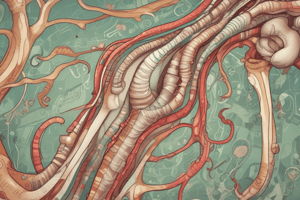Podcast
Questions and Answers
What is the difference between intracellular and extracellular digestion?
What is the difference between intracellular and extracellular digestion?
Intracellular digestion occurs inside food vacuoles within cells, while extracellular digestion takes place outside of cells.
List the four main steps of digestion and briefly describe each.
List the four main steps of digestion and briefly describe each.
The four main steps are ingestion (eating food), digestion (mechanical and chemical breakdown), absorption (nutrient uptake), and excretion (removal of waste).
What is the function of the crop in earthworms and how does it differ from that in birds?
What is the function of the crop in earthworms and how does it differ from that in birds?
In earthworms, the crop stores soil and moistens food, while in birds, it mainly serves for food storage to aid faster consumption.
Explain the role of the pancreas in the mammal digestive system.
Explain the role of the pancreas in the mammal digestive system.
Describe the purpose of the spiral valve in a dogfish shark's digestive system.
Describe the purpose of the spiral valve in a dogfish shark's digestive system.
How does the liver function in digestion for both frogs and pigs?
How does the liver function in digestion for both frogs and pigs?
What is the function of the gallbladder in mammals?
What is the function of the gallbladder in mammals?
Compare the digestive systems of sponges and humans regarding the completeness of digestion.
Compare the digestive systems of sponges and humans regarding the completeness of digestion.
Flashcards
Intracellular Digestion
Intracellular Digestion
The breakdown of food within cells, occurring inside food vacuoles.
Extracellular Digestion
Extracellular Digestion
The breakdown of food outside of cells, typically within a specialized digestive cavity.
Digestive System: Ingestion
Digestive System: Ingestion
The process of taking in food. This involves chewing and biting in animals with teeth.
Digestive System: Digestion
Digestive System: Digestion
Signup and view all the flashcards
Digestive System: Absorption
Digestive System: Absorption
Signup and view all the flashcards
Digestive System: Excretion
Digestive System: Excretion
Signup and view all the flashcards
Crop Function
Crop Function
Signup and view all the flashcards
Liver Function
Liver Function
Signup and view all the flashcards
Study Notes
Lab 8: Digestive System
- Intracellular digestion—Process where cells break down and absorb nutrients inside food vacuoles.
- Extracellular digestion—Process of breaking down food outside of cells.
Steps of Digestion
- Ingestion—Eating food.
- Digestion—Mechanical and chemical breakdown of food.
- Absorption—Absorbing nutrients.
- Excretion—Removal of waste.
Crop in Animals
- Earthworm—Storage of soil, moisten food.
- Grasshopper—Storage of food.
- Birds—Food storage, help quicker eating.
Dogfish (Shark)
- Liver—Stores oil to help it float.
- Gall Bladder—Stores bile secreted by the liver.
- Stomach—Stores food; produces acids.
- Spleen—Produces red blood cells.
Pig
- Liver—Produces bile and regulates blood sugar.
- Gall Bladder—Stores bile when not needed.
- Stomach—Storage for food.
- Spleen—Helps the immune system (produces white blood cells).
- Pancreas—Regulates blood sugar, secretes digestive enzymes/hormones.
- Small Intestine—Breaks down food (duodenum, jejunum, ileum).
- Large Intestine—Absorbs nutrients and water (colon, cecum).
- Rectum—Stores waste before excretion.
Frog
- Liver—Produces bile, stores fat.
- Gall Bladder—Stores bile, neutralizes acid.
- Fat Bodies—Provide energy, insulation.
- Small Intestine—Breaks down food, absorbs nutrients.
- Large Intestine—Holds waste, absorbs water.
- Pancreas—Secretes enzymes, hormones.
- Stomach—Stores food, digestive juices.
Mammal Digestive System
- Oral Cavity—Food enters and is broken down by teeth and saliva.
- Esophagus—Connects to the stomach.
- Stomach—Storage, secretes digestive juices, acidic.
- Small Intestine—Digestion of proteins, absorption.
- Large Intestine—Reabsorbs water, processes waste.
- Rectum and Anus—Stores feces, opening where waste leaves.
- Accessory Organs—Gall bladder (stores bile), liver (secretes bile).
Studying That Suits You
Use AI to generate personalized quizzes and flashcards to suit your learning preferences.




